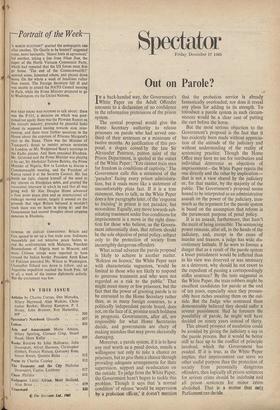Out on Parole?
TN a back-handed way, the Government's 'White Paper on the Adult Offender amounts to a declaration of no confidence in the reformative pretensions of the prison system.
The central proposal would give the Home Secretary authority to release prisoners on parole who had served one- third of their sentences or a minimum of twelve months. As justification of this pro- posal, a slogan coined by the late Sir Alexander Paterson, patron saint of the Prison Department, is quoted at the outset of the White Paper: 'You cannot train men for freedom in conditions of captivity.' The Government calls this a statement of the `paradox' facing every prison administra- tion, but it reads more like a statement of uncomfortably plain fact. If it is a true statement, then to talk, as the White Paper does a few paragraphs later, of the 'response to training' in prison is not paradox, but moonshine. Equally, any move towards sub- stituting troatment under free conditions for imprisonment is a move in the right direc- tion for those who believe, as the Govern- ment inferentially does, that reform should be the sole objective of penal policy, subject only to the protection of society from incorrigibly dangerous offenders.
What actual advance the parole proposal is likely to achieve is another matter. `Release on licence,' the White Paper says with characteristic vagueness, 'would be limited to those who are likely to respond to generous treatment and who were not regarded as a risk to the public.' That might mean many or few prisoners, but the fact that the power of granting parole is to be entrusted to the Home Secretary rather than, as in many foreign countries, to a politically independent parole board, does not, on the face of it, promise much boldness in prognosis. Governments, after all, are responsible for what Home Secretaries decide, and governments are chary of making mistakes that may prove electorally damaging.
Moreover, a parole system, if it is to have any real worth as a penal device, entails a willingness not only to take a chance on prisoners, but to give them a chance through providing adequate arrangements for their supervision, support and re-education on the outside. To judge from the White Paper, the Government hasn't begun to tackle this problem. Though it says that 'a normal condition' of release 'would be supervision by a probation officer,' it doesn't mention that the probation service is already, fantastically overloaded; nor does it reveal any plans for adding to its strength. To introduce a parole system in such circum- stances would be a clear case of putting the cart before the horse.
But the most serious objection to the Government's proposal is the fact that it has evidently been made without apprecia- tion of the attitude of the judiciary and without understanding of the reality of sentencing practice. Though the Home Office may have no use for retribution and individual deterrence as objectives of imprisonment—the White Paper rejects the one directly and the other by implication— that is not a view shared by the judiciary, or, for that matter, by the majority of the public. The Government's proposal seems bound to be interpreted as an administrative assault on the power of the judiciary, inas- muckas the argument for the parole system is based on the assumption that reform is the paramount purpose of penal policy.
It is an assault, furthermore, that hasn't the merit of being invincible. The sentencing power remains, after all, in the hands of the judiciary, and, except in the cases of murder and treason, a judge has wide dis- cretionary latitude. If he were to foresee a danger that as a result of the parole system a lesser punishment would be inflicted than in his view was deserved or was necessary as a deterrent, why should he not resort to the expedient of passing a correspondingly stiffer sentence? By the tests suggested in the White Paper, the train robbers might be excellent candidates for parole at the end of ten years, especially since they presum- ably have riches awaiting them on the out- side. But the Judge who sentenced them demonstrably believed they should suffer a severer punishment. Had he foreseen the possibility of parole, he might well have decided on ninety years instead of thirty.
This absurd prospect of escalation could be avoided by giving the judiciary a say in the parole process. But it would be better still to face up to the conflict of principle involved, which the Government has evaded. If it is true, as the White 'Paper implies, that imprisonment can serve no other useful purpose than the protection of society from perennially dangerous offenders, then logically all prison sentences for serious crime should be indefinite and all prison . sentences for minor crime abolished. That is a matter that only Parliament can decide.






























 Previous page
Previous page